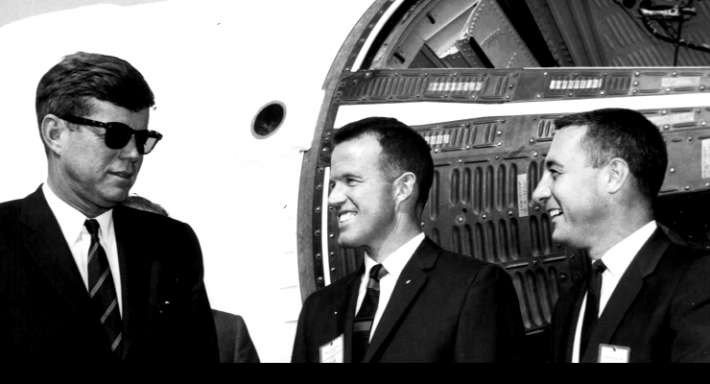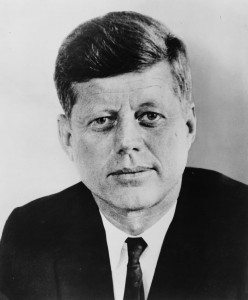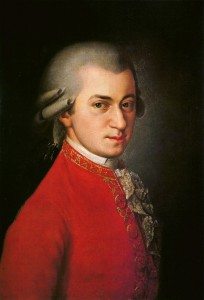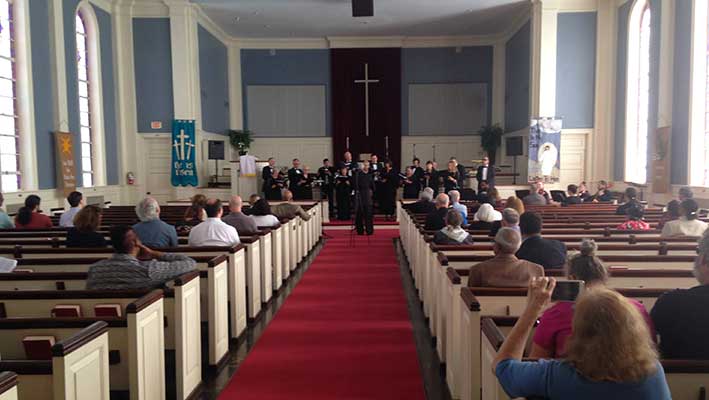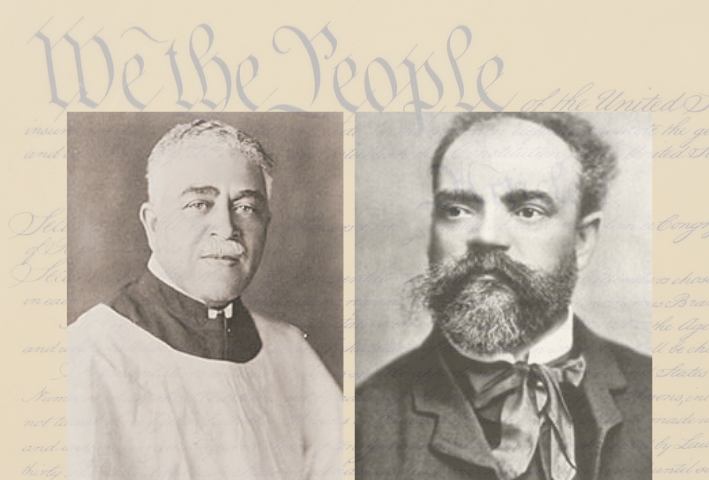This article appeared in the January 24, 2014 issue of Executive Intelligence Review. We post it here with the permission of the publisher.
By Dennis Speed
I was Twenty-three years old at the turn of the century. It was a time of brave expectations. Many believed that a new epoch was at hand—that the dawn of the twentieth century would prove to be a turning point in the affairs of men. They cited recent scientific advances and predicted a future of great social progress. The era, they said, was approaching when poverty and hunger would at last disappear. In the way people make fervent resolutions at the start of a new year, the world seemed to be resolving at the start of a new century to undergo a change for the better. Who then foresaw that the coming decades would bring the unimaginable horrors of two world wars, concentration camps, and atomic bombs?
Pablo Casals,
Joys And Sorrows
Those capable of foresight—and for civilization to survive, the American population must become so capable—will recognize the truth in Casals’ observation. Yet, it is our duty to shape the future, and thus to know it. To paraphrase another slain U.S. President: We are now engaged in a 150 years war, testing whether any nation, so conceived and so dedicated, as is the United States, can long endure. Assassinations against American Presidents, have been the preferred criminal method of choice, for dealing with the problem of the American Cultural Exception. So it was with John Kennedy, his brother Robert, and Dr. Martin Luther King.
To respond to the challenge of reproducing and increasing the power of foresight for civilization’s survival in the short and long term is the unique mission of the Schiller Institute, a mission which the Institute brought to the City of Boston on Sunday, Jan. 19. The Schiller Institute Chorus, augmented by additional singers and an orchestra largely comprised of volunteers from the New England Conservatory of Music, presented Mozart’s Requiem in its entirety to an audience of 1,200 at Boston’s Cathedral of the Holy Cross, performed exactly 50 years to the day, of a 1964 Solemn High Requiem Mass specially requested by the Kennedy family.
One year after his October 1962 defiance of that faction of “principalities and powers,” including Britain’s Lord Bertrand Russell, that dared to believe that nuclear war against the Soviet Union was not only conceivable, but winnable (the Cuban Missile crisis), John Kennedy was murdered in Dallas. His assassination, along with that of his brother Robert, and of Martin Luther King, has hung “like a dead hand upon the brain of the living,” until now. Four generations have been unable to shake off their effects. That is because there is only one reliable method for doing so: People must be elevated above and beyond their own pre-selected, limiting self-expectation. People require, not “the facts” of “what really happened,” but the fire of insight needed to reverse our unending national trauma. No preaching, slogans, or imprecations will cause a terrorized people to have courage. Only their own voices, heard as through the mirror of a great artistic performance, can move the despairing to a higher place, a mountaintop where their souls, much to their surprise, actually live.
Conductor and Schiller Institute Music Director John Sigerson, in an interview with a reporter from The Pilot, newspaper of the Boston diocese, was asked whether the Schiller Institute believes that “Classical music can create a change in our culture.” Sigerson’s answer to this was “No.” Rather, he asserted, it was the juxtaposition of the “musical” with the “non-musical,” in this case several excerpts of speeches by JFK, heard at precisely selected points in the Requiem, that would allow members of the audience to be provoked to change their minds, and thus hear the music. Sigerson said: “The JFK speeches alone wouldn’t work, and the music alone wouldn’t work. It’s the uncomfortable juxtaposition of the two that works,” this by creating an unexpected cognitive discomfort and tension for the audience.
The Schiller Institute has employed for the second time—the first being in Vienna, Va., on Nov. 22, the 50th anniversary of the President’s assassination—the spiritual and therapeutic power of the MozartRequiem to restore the power of cognition to Americans. As Schiller Institute Founder Helga Zepp-LaRouche said in her remarks, such a Classical revival is necessary to inspire Americans to take up Kennedy’s mission again, even as the world currently stands at the edge of thermonuclear war.
The Preparation of the Audience
Master of Ceremonies Matthew Ogden provided a prelude to the music, using a selection of speakers, messages, and quotations to allow everyone in the audience equal access to the depth of meaning contained in the moments they were about to experience, “not in time, but in the Idea,” as Nicholas of Cusa says. For those two and one-half hours, the “virtual reality” brainwashing that accounts for the toleration of a Nietzschean “all is permissible” popular “culture” was interrupted. Those who might have objected that “it’s too long for the audience to concentrate” were once again proven wrong. It was essential that they be prepared to listen, and not merely hear, the Mozart composition. But why?
In the words of the German conductor Wilhelm Furtwängler, “As far as music is concerned, there is nothing about which the so-called ‘public’ knows less than about its own mind. Above all, there is one prior condition needful to the listener—whether as an individual or as an audience—if he is to formulate a judgment of real value: and that is, he must have enough time.” This essential pre-condition having been met before a single note was sung, the audience was thus pre-organized to respond at a higher level than it would otherwise have been capable, even with the best musical performance.
There was more to the audience preparation, however. This audience was assembled through a thorough, consistent political intervention and fight. This audience recruitment was the result of an intense organizing effort conducted over about six weeks or so. There was a successful “outreach” campaign throughout the Boston metropolitan area. One portion of the audience had come because of ads in theBoston Globe and other news outlets. The Pilot was cited by many as their source of news. Several Boston schools and colleges were represented, along with senior centers and various community organizations. Leaflets and posters were distributed in Chinese, Vietnamese, Spanish, Portuguese, English, and French. Several foreign consulates attended the concert, as well as state representatives from Maine and Rhode Island. There were messages from Michael D. Higgins, President of the Republic of Ireland; Boston City Councilman Steven Murphy; and from Nicholas Di Virgilio, tenor, the only surviving soloist from the 1964 concert (see below for his remarks).
Many who attended recalled having been at the 1964 performance: it must be remembered that for the then-largely Catholic Boston, Holy Cross was their local church. Ray Flynn, former Boston Mayor, and later, Ambassador to the Vatican, who had also attended the 1964 performance, expressed the sense of gratitude and true happiness that the citizens of Boston felt for the thoughtfulness that went into ensuring that the historic nature of the occasion did not go unrecognized (see box).
The Performance, and the ‘Pitch’
The Schiller Institute Chorus, soloists Ron Williams (baritone), William Ferguson (tenor), Heather Gallagher (mezzo-soprano) and Nataly Wickham (soprano), and the largely New England Conservatory of Music-based freelance orchestra constituted for Sunday’s performance, accomplished its primary task: to present the Mozart Requiem as a single, unified Idea. The unity of effect of the performance allowed the words of President Kennedy, the which worked to punctuate and underscore Mozart’s presentation of the idea of immortality, to pose a dialogue about the nature of immortality’s triumph over death with each audience member, as well as the audience as a whole. Maestro Sigerson also noted that the performances of the “Recordare” and “Benedictus” sections of the piece, both set for vocal quartet, were “of a piece” with the entirety, and were delivered with the exact meaning that Mozart intended them to convey.
The performance was conducted at a tuning of A=432, nearly a quarter tone lower than most modern performances, and is a standard feature of Schiller Institute musical practice. While this is sometimes referred to as the “lower” tuning, that designation is imprecise. It is the propertuning; it is merely “lower” than what is currently practiced as the wrong, “higher” tuning. The tuning range for music is perhaps more clearly stated as middle C=256 cycles per second, which yields an A=427-432. The C=256 is the tuning at which the Mozart Requiem was composed, designed, and intended to be heard.
The next day, The Boston Music Intelligencer, self-described as a “virtual journal and essential blog of the classical music scene in greater Boston,” ran an extensive positive review under the headline, “JFK Remembered in Musical Tribute,” characterizing it as “a polished traditional performance.”
One of the supporters of the Schiller Institute, conductor Anthony Morss, who has worked with, and conducted experiments demonstrating the reasons for insisting on what is also referred to as, “the Verdi pitch,” supplied an essay that appeared in the concert program intended to provide some background on the matter (see below).
Art as Necessity
The necessity of art—not only its moral, but physical necessity—was stressed in the brief and precise remarks directed to the audience by Schiller Institute founder Helga Zepp-LaRouche.
“It is necessary to commemorate the celebration of Mozart’s Requiemwhich was performed for John F. Kennedy, 50 years ago in this cathedral. It is urgent to evoke again the divine spirit of beauty of Mozart’s composition in order to reconnect us with the better world which both Kennedy and Mozart represent,” she said. Zepp-LaRouche insisted, along with the “Poet of Freedom” Friedrich Schiller, after whom the Institute, which celebrates its 30th year in 2014, was named and founded by her, that death is swallowed up in the victory of the power of musical immortality as Mozart, Bach, and Beethoven exemplify, and as the power of the Kennedy Apollo Project also demonstrates. Kennedy’s optimism allowed every American, and, with the successful landing of the human species on the moon, everyone on the planet, to know, by demonstration, that the mind, though contained in a body, is not that body; the mind has no physical limits (see box).
Zepp-LaRouche’s reference to “reconnection to a better world” highlighted the inevitable and necessary Ideas that were not merely evoked, but provoked, by the performance. And, it must needs be so: Kennedy’s appreciation for and promotion of the Classical arts and of Classical artists was at the very foundation of his Presidency, though this has been largely ignored in these intervening years. Who, for example, would even today recognize these as the words of JFK, given on the occasion of a commemoration of the poet Robert Frost at Amherst College, October 26, 1963, less than a month before his death?
“Our national strength matters, but the spirit which informs and controls our strength matters just as much. This was the special significance of Robert Frost…. it is hardly an accident that Robert Frost coupled poetry and power, for he saw poetry as the means of saving power from itself. When power leads men towards arrogance, poetry reminds him of his limitations. When power narrows the areas of man’s concern, poetry reminds him of the richness and diversity of his existence. When power corrupts, poetry cleanses. For art establishes the basic human truth which must serve as the touchstone of our judgment.”
Now, and Then
There were some key differences between the 1964 and 2014 performances. In 1964, it was an astonishing step to include the Mozart Requiem in the context of the Catholic Solemn High Requiem Mass ceremony—the first time that that had ever been done in the United States.
There was another important difference. In the case of this performance-commemoration, 50 years of erosion of the thinking capacities of the American people, particularly by means of the cacophonous obscenity known as “popular entertainment”—including in the form of the post-2000 American Presidencies—required a uniquely insightful rendering of the music by the performers.
It is essential to note, that the chorus was composed of non-professional Schiller Institute singers, many of whom are involved in daily organizing work with both Helga and Lyndon LaRouche. Initially, many Boston-based semi-professional and professional singers had volunteered to be part of the performance, but withdrew because of a campaign denouncing the Schiller Institute, carried out by certain local members of the Democratic Party to intimidate singers. Some refused to listen, and thus “qualified” themselves to participate. Importantly, not only did the local organizers of the event, composed primarily of former members of the LaRouche Youth Movement who were assisted by an experienced and older group of LaRouche Political Action Committee organizers, not attempt to conceal in any way “who they were.” In fact, the organizers insisted that everyone they speak with fully understandwhy it was that only the Schiller Institute, and Lyndon and Helga LaRouche, out of everyone in the United States, had insisted that this 50th anniversary commemoration take place.
To answer that question, we pose a seemingly unrelated question, actually identical to the first.
Why was Kennedy, despite his flaws, seen as exceptional by people who were often critical (and sometimes pitiless) judges of human character, such as Charles de Gaulle, Douglas MacArthur, and Eleanor Roosevelt? Posed another way: Why did Kennedy embody for these severe critics of human character, as well as for many “normal Americans,” an efficient deployment of the U.S. Presidency on behalf of furthering the progress, not merely of the United States, but of mankind?
The answer to this is posed as follows.
A statement from his Jan. 20, 1961 Inaugural Address, differentiated Kennedy then, and differentiates Kennedy now, from all the Presidents who have served after him: After listing all of the tasks his Administration will aspire to accomplish, including “a call to bear the burden of a long twilight struggle, year in and year out, ‘rejoicing in hope, patient in tribulation’—a struggle against the common enemies of man: tyranny, poverty, disease and war itself,” Kennedy observed:
“All this will not be finished in the first one hundred days. Nor will it be finished in the first one thousand days, nor in the life of this Administration, nor even perhaps in our lifetime on this planet. But let us begin.”
Kennedy forecasted his “willed fate” truthfully, and acted accordingly. Despite all the things he did not live to accomplish, in that thousand days, Kennedy managed to save the world from nuclear destruction, and send to, and put the human race on the Moon. The capacity to access the revolutionary principle embedded in the American Constitution and its Declaration of Independence, on which the Lincoln and Kennedy Administrations built their respective commitments and contributions to American progress, has simply not emanated from the Presidency as the guiding policy outlook of any U.S. Administration since Kennedy’s assassination.
In fact, today, the opposite commitment now exists, in the form of the Obama Administration, and the predecessor Bush Administration, and must be reversed by an American people made culturally competent to do so.
That is the reason that the Schiller Institute was uniquely qualified to propose, organize, and perform the Nov. 22 and Jan. 19 Kennedy remembrances. We refuse to submit to voluntary amnesia. There is a connection between courage and intelligence. Kennedy lived up to his own studies of courage under adversity. None of us can do less.















